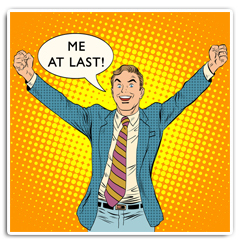 If there's one thing that we LGBTQ people need in order to live a balanced, meaningful, more joyful life, it's self-acceptance.
If there's one thing that we LGBTQ people need in order to live a balanced, meaningful, more joyful life, it's self-acceptance.
Without self-acceptance and self-esteem life becomes a battle raged from within, a never-ending struggle to comply with other people's ideas of what our life should be and how we should live it.
Self-Esteem
Though often linked together, self-acceptance and self-esteem are a little different. With a healthy self-esteem, we are able to appreciate ourselves; we can recognize our positive qualities and use our valuable abilities to propel ourselves forward.
This helps us to achieve and accomplish, which in turn enhances our sense of self-esteem, adding to our sense of self-worth. Through self-esteem we validate our being and know that our life is somehow worthwhile.
Self-Acceptance
Self-acceptance denotes something even broader, and perhaps more profound. With it we are able to encompass and adopt all aspects of ourselves, even those darker parts that rankle and sometimes feel awkward -- the "shadow" parts.
With self-acceptance comes the ability to acknowledge our limitations and weaknesses, to accommodate our inner darkness -- as well as our moments of blinding light -- without allowing these aspects to destroy our balance or eclipse our sense of self-esteem.
And it is possible to do this while still committing to a lifetime of personal growth, but this means taking whatever harsh self-judgment we might have been passing on ourselves and transforming it into understanding and compassion.
Self-Doubt
Almost all of us, gay and straight, arrive at adulthood carrying some form of baggage from our early years. For LGBTQ people especially, the negative bias and messages of disapproval generated by an all too-often homophobic and heterosexist environment, by religion, or by myth, are likely to have planted seeds of unworthiness and self-doubt deep within.
Our journey may have left us with feelings of fear, not only toward others, but at some level, toward ourselves.
These things are the enemies of self-acceptance and self-esteem. In order to be happy, we need to feel safe. We need also to trust ourselves enough to believe that we can experience happiness. But more than this, we need to believe that we are worthy of happiness.
The greater our self-acceptance, the more we allow ourselves to recognize and accept happiness in our lives.
Dependence
We human beings come into the world in a state of need and dependence. We are born helpless and in need of protection. As infants, instinctively we know the importance of pleasing and, if necessary, placating those with power over us -- the adults. We need them to like us, and so we submit to their judgmental authority.
Failure to accomplish this might mean that they will stop providing us with what we require: protection and the love that fulfills our needs.
Approval Seeking
As we grow and move into the greater outside world, we carry this need with us to some degree as we seek to demonstrate our worth to others who might judge us. We try our best to win their approval.
Being LGBTQ, we have been exposed to homophobia on many levels, which may at some level have shaken our faith in ourselves and perhaps damaged the belief in our full rights as people.
Because of this, many of us become caught up in an endless cycle of seeking approval from others by being super good, super nice, or super accommodating and likable. After all, the subliminal reasoning goes, if people like us, then they might even forgive us for being LGBTQ.
Though we may not recognize it, our approval-seeking behaviors are a continuation of our need for the validation we may not have been able to generate from within. They are an extension of our own lack of self-acceptance and damaged self-esteem.
Only by understanding how this happened and releasing ourselves from the belief that we are neither "guilty" nor "not guilty" of being gay, lesbian, bi, trans or queer -- we simply are LGBTQ -- can we reclaim our lives and enter into a balanced relationship with ourselves, one that might previously have eluded us.
Becoming Yourself
It takes courage and a good deal of persistence for anyone to become themselves -- the person they born to be. It is an on-going process for all of us, one that will continue until we die.
Becoming yourself requires you to revisit old beliefs and the emotions that they generated, recognizing that though you are responsible for your sexual behavior, you are not to blame for your sexuality.
Sexuality and sexual orientation have nothing to do with guilt or innocence. They simply are.
Only when we live this truth can we know true self-acceptance -- and the joy that comes with it.
Reference:
Excerpts taken from the book 'How To Be Gay and Happy', Field, P. (2016) London, Rainbow Champions Publishing
Peter Field is a UK registered psychotherapist and hypno-psychotherapist. He is the author of 'How To Be Gay and Happy', and Director of Rainbow Champions, an organization that provides assertive life-skills and confident communication training to LGBTQ networks and team members in companies and organizations throughout the UK and Europe.
